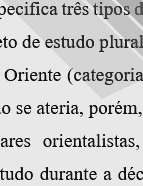

The inter-war and immediate post-war period was marked by the end of what Hespanha called the “republican mythology” that returned to the great figures of the history of Portuguese expansion (“O Orientalismo em Portugal”, 1999, p. 30), as well as by the simultaneous rise of the right with the establishment of the Estado Novo. This period loosely corresponds to a phase of stagnation for both national historiographical production and Oriental studies in Portugal, but was also conducive to the cultivation of discourses concerning the country’s power over the colonial Other, whether ‘oriental’ or African. By aligning with the ideals, interests and agenda of the regime of the Estado Novo, Portuguese historiography isolated itself from other traditions produced outside of the country and became a prisoner to discourses which glorified the patria and revendicated its colonial status, while also replicating racial theories posited by the likes of Ernest Renan and Gobineau, which were singularly prejudiced against foreigners. The theory of Lusotropicalism appropriated by the Estado Novo in order to reinforce its own ideology in the 1950s and 60s represented nothing less than a return to an orientalist discourse, in Said’s definition of the term, a fact underlined by the theory’s reaffirmation and systematization in a conference at the Vasco da Gama Institute in Goa in 1951. Events glorifying the patria also became more showy and assumed a more educational role. The Portuguese World Exhibition in 1940, held in celebration of the double centenary of the foundation of Portugal and the restoration of its independence, and the commemorations of the fifth centenary of the death of Prince Henry the Navigator in 1960 offer two examples of this trend. História de Portugal [The History of Portugal], published in seven volumes between 1928 and 1954 and edited by Damião Peres, was presented as a monumental achievement commemorating the eighth centenary of the foundation of the nation, while História da Expansão Portuguesa no Mundo [The History of Portuguese Global Expansion] was a more measured affair, published in three volumes between 1937 and 1940, under the supervision of António Barão, Hernâni Cidade and Manuel Múrias. Nonetheless, its title still evokes an ecumenical project and Portugal’s role in the making of world history. The last volume of this work was also published to coincide with the commemorations of the centenary of the foundation and restoration of Portugal. The country’s maritime expansion was a recurrent theme and rhetorical tool in Portuguese historiography, serving as the base for symbolic narratives about the history of Portugal that are, at their root, narratives of identity through which the nation sought to preserve, instrumentalize and update a collective historical memory.
The 1960s marked the end of Portugal’s influence in its overseas territories. First, in 1961, the Portuguese State of India was dismantled, one year after Portuguese daily newspaper O Século had dedicated a supplement to the colony on 9th December 1960, adorning the front cover with the words “the unity, the greatness and the prestige of Portugal.” This was, no doubt, a last gesture of denial in the face of a conclusion already foreseen by almost everybody, a final appeal to an imperial myth which had served to defend the regime and justify its overseas endeavours. Next came the decolonization processes of Portugal’s possessions in Africa, before the country’s long colonial cycle finally drew to a definitive end with the transfer of sovereignty over Macau to the Chinese government in December 1999.
